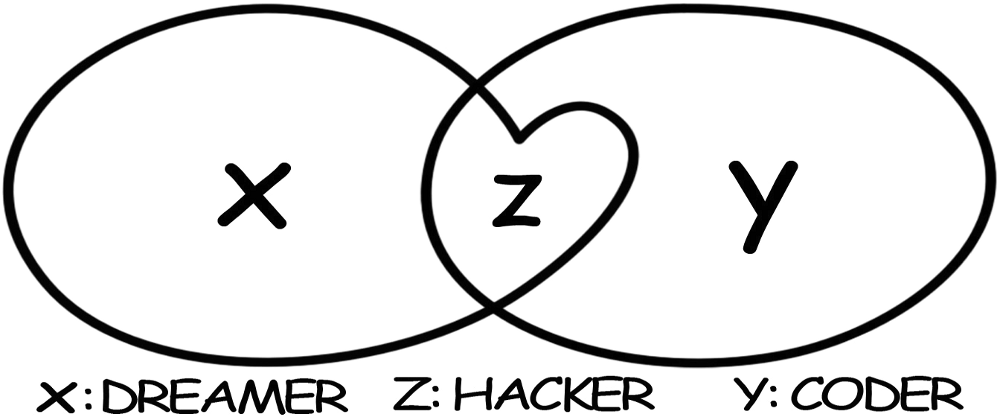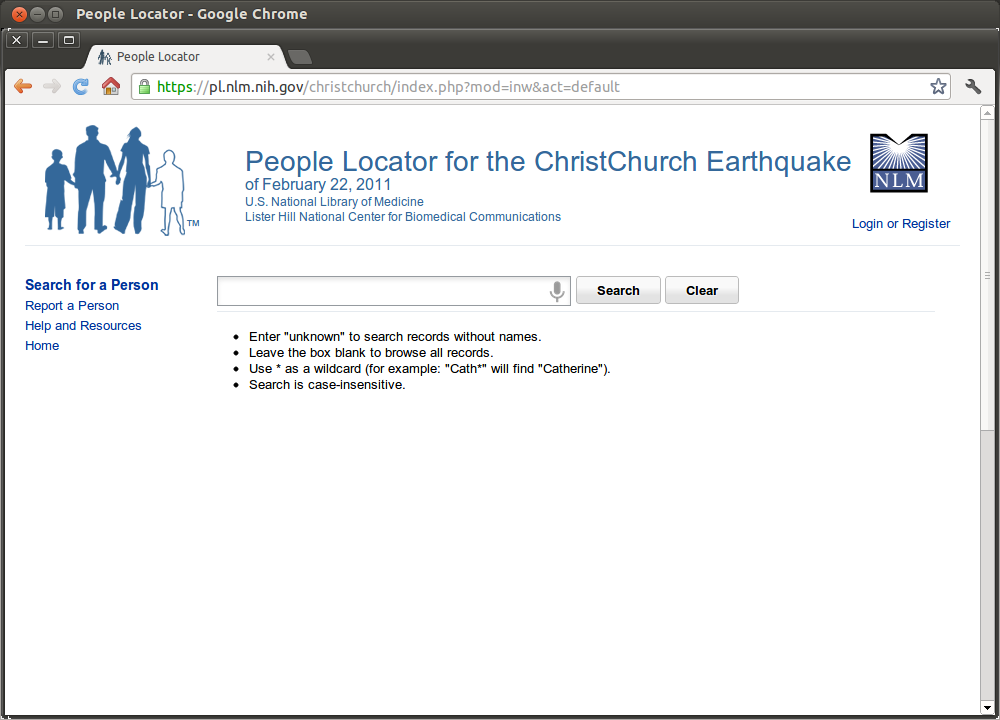Coding and Dreaming
PHPConMX
Mexico City
Sept. 26, 2014
http://talks.php.net/mx14Rasmus Lerdorf
@rasmus
1993
#include <stdio.h>
#include <stdlib.h>
#include <ctype.h>
#include <string.h>
#define ishex(x) (((x) >= '0' && (x) <= '9') || ((x) >= 'a' && \
(x) <= 'f') || ((x) >= 'A' && (x) <= 'F'))
int htoi(char *s) {
int value;
char c;
c = s[0];
if(isupper(c)) c = tolower(c);
value=(c >= '0' && c <= '9' ? c - '0' : c - 'a' + 10) * 16;
c = s[1];
if(isupper(c)) c = tolower(c);
value += c >= '0' && c <= '9' ? c - '0' : c - 'a' + 10;
return(value);
}
void main(int argc, char *argv[]) {
char *params, *data, *dest, *s, *tmp;
char *name, *age;
puts("Content-type: text/html\r\n");
puts("<HTML><HEAD><TITLE>Form Example</TITLE></HEAD>");
puts("<BODY><H1>My Example Form</H1>");
puts("<FORM action=\"form.cgi\" method=\"GET\">");
puts("Name: <INPUT type=\"text\" name=\"name\">");
puts("Age: <INPUT type=\"text\" name=\"age\">");
puts("<BR><INPUT type=\"submit\">");
puts("</FORM>");
data = getenv("QUERY_STRING");
if(data && *data) {
params = data; dest = data;
while(*data) {
if(*data=='+') *dest=' ';
else if(*data == '%' && ishex(*(data+1))&&ishex(*(data+2))) {
*dest = (char) htoi(data + 1);
data+=2;
} else *dest = *data;
data++;
dest++;
}
*dest = '\0';
s = strtok(params,"&");
do {
tmp = strchr(s,'=');
if(tmp) {
*tmp = '\0';
if(!strcmp(s,"name")) name = tmp+1;
else if(!strcmp(s,"age")) age = tmp+1;
}
} while(s=strtok(NULL,"&"));
printf("Hi %s, you are %s years old\n",name,age);
}
puts("</BODY></HTML>");
}
1993
use CGI qw(:standard);
print header;
print start_html('Form Example'),
h1('My Example Form'),
start_form,
"Name: ", textfield('name'),
p,
"Age: ", textfield('age'),
p,
submit,
end_form;
if(param()) {
print "Hi ",em(param('name')),
"You are ",em(param('age')),
" years old";
}
print end_html;1994
<html><head><title>Form Example</title></head>
<body><h1>My Example Form</h1>
<form action="form.phtml" method="POST">
Name: <input type="text" name="name">
Age: <input type="text" name="age">
<br><input type="submit">
</form>
<?if($name):?>
Hi <?echo $name?>, you are <?echo $age?> years old
<?endif?>
</body></html>PHP Announcement June 8, 1995
Posted to comp.infosystems.www.authoring.cgi
Subject: Announce: Personal Home Page Tools (PHP Tools)
Announcing the Personal Home Page Tools (PHP Tools) version 1.0.
These tools are a set of small tight cgi binaries written in C.
They perform a number of functions including:
. Logging accesses to your pages in your own private log files
. Real-time viewing of log information
. Providing a nice interface to this log information
. Displaying last access information right on your pages
. Full daily and total access counters
. Banning access to users based on their domain
. Password protecting pages based on users' domains
. Tracking accesses ** based on users' e-mail addresses **
. Tracking referring URL's - HTTP_REFERER support
. Performing server-side includes without needing server support for it
. Ability to not log accesses from certain domains (ie. your own)
. Easily create and display forms
. Ability to use form information in following documents
Here is what you don't need to use these tools:
. You do not need root access - install in your ~/public_html dir
. You do not need server-side includes enabled in your server
. You do not need access to Perl or Tcl or any other script interpreter
. You do not need access to the httpd log files
The only requirement for these tools to work is that you have
the ability to execute your own cgi programs. Ask your system
administrator if you are not sure what this means.
The tools also allow you to implement a guestbook or any other
form that needs to write information and display it to users
later in about 2 minutes.
The tools are in the public domain distributed under the GNU
Public License. Yes, that means they are free!
For a complete demonstration of these tools, point your browser
at: http://www.io.org/~rasmus
--
Rasmus Lerdorf
rasmus@io.org
http://www.io.org/~rasmusC API for the Web
void Cos(void) {
Stack *s;
char temp[64];
s = Pop();
if(!s) {
Error("Stack error in cos");
return;
}
sprintf(temp,"%f",cos(s->douval));
Push(temp,DNUMBER);
}And you could then use it like this:
<html><head><title>Cos Example</title></head>
<body><h1>Cos Example</h1>
<?echo Cos($input)?>
</body></html>Focus on the Ecosystem
- LAMP wasn't an accident
- Robustness, Performance and Security
- ♥ shared hosting ISPs
Scale
- Scaling up is expected
- Scaling down is surprisingly hard
- Doing both is rocket science
Performance
- mod_php
- shared-nothing perfect sandbox model
Robustness
- SQL LIMIT clause
- Promote Prefork shared-nothing model
Security
- max_execution_time
- memory_limit
- safe mode
What was he thinking?
- Case insensitive function names?
- Naming inconsistencies?
- What's with the $ signs?
- Globals?
- register_globals?
- magic_quotes?
OMGWTFBBQ?
array_search($needle, $haystack);
strstr($haystack, $needle);
in_array($needle, $haystack);
substr_count($haystack, $needle);
array_key_exists($needle, $haystack);
strchr($haystack, $needle);2014
PHP 5.5
Performance Improvements
- Nested calls
- Call stack pre-allocated by compiler
- Bundled opcode cache
✔ Generators
function xrange($start, $end) {
for ($i = $start; $i <= $end; $i ++) {
yield $i;
}
}
foreach (xrange(0, 5) as $i) {
echo $i, "\n";
}✔ Coroutines
function logger($fileName) {
$fileHandle = fopen($fileName, 'a');
while (true) {
fwrite($fileHandle, yield . "\n");
}
}
$logger = logger(__DIR__ . '/log');
$logger->send('Foo');
$logger->send('Bar');For an advanced explanation of coroutines, read this article by Nikita Popov
✔ finally
$db = mysqli_connect();
try {
call_some_function($db);
} finally {
mysqli_close($db);
}✔ list() in foreach
$names = [ ['John','Smith'], ['Fred','Johnson'] ];
foreach($names as list($first,$last)) {
echo $first,$last;
}✔ Const array/string Dereferencing
echo array(1, 2, 3)[0]; //output 1
echo "foobar"[3]; //output b
echo [1,3,4][2]; //output 4✔ empty() support for functions/expressions
✔ curl upload functionality rewritten
✔ Simplified password hashing API
// Hash
$hash = password_hash("super secret",PASSWORD_BCRYPT);
// To validate $pwd against the stored hash
if (password_verify($pwd, $hash)) {
echo 'Password is valid!';
} else {
echo 'Invalid password.';
}PHP 5.6
✔ Variadic functions
class MySQL implements DB {
public function query($query, ...$params) {
$stmt = $this->pdo->prepare($query);
$stmt->execute($params);
return $stmt;
}
}
$q = 'SELECT * FROM users WHERE id = ?';
$user = $db->query($q, $userID)->fetch();✔ Argument Unpacking
// A better call_user_func_args
$args1 = [1, 2, 3];
$args2 = [4, 5, 6];
test(...$args1, ...$args2); // [1, 2, 3, 4, 5, 6]
test(1, 2, 3, ...$args2); // [1, 2, 3, 4, 5, 6]
test(...$args1, 4, 5, 6); // Fatal error: Cannot use positional argument after argument unpacking✔ Constant scalar expressions
class Foo {
const FOO = 1 + 1;
const BAR = 1 << 1;
const GREETING = "HELLO";
const BAZ = self::GREETING." WORLD!"
}✔ Add right-associative power operator **
echo 2 ** 3 ** 2; // 512 (not 64)
echo -3 ** 2; // -9 (not 9)
echo 1 - 3 ** 2; // -8
echo ~3 ** 2; // -10 (not 16)✔ Internal operator overloading for internal features like GMP
echo 2**512;
echo "\n";
$n = gmp_init(2);
echo $n**512;1.3407807929943E+154
13407807929942597099574024998205846127479365820592393377723561443721764030073546976801874298166903427690031858186486050853753882811946569946433649006084096
✔ use function and use const namespace imports
include 'template.inc';
include 'db.inc';
use function template\header, template\footer, db\query;
header('My Page');
query('select * from stuff');
footer();✔ default_charset ini now applies to internal funcs
✔ SSL Peer verification by default
✔ openssl certificate fingerprints
✔ SAN x509 ext matching when verifying host names
✔ automatic DoS prevention of TLS renegotiation attacks
✔ and many more openssl-related options
✔ Asynchronous PostgreSQL database connections
✔ Non-blocking PostgreSQL queries
✔ New phpdbg SAPI
✔ Support for > 2GB file uploads
✔ The php://input stream is now re-usable
✔ Added hash_equals() for timing attack safe string comparison
✔ Added gost-crypto (CryptoPro S-box) hash algorithm
✔ FPM workers can now change their apparmor profile
✔ OCI8 Improvements
PHP 7
✔ phpng engine improvements
- 10-25% performance gain on most realworld applications
- lower memory usage
- Cleans up some things for a future JIT
✔ Abstract Syntax Tree
✔ 64-bit integer support on Windows
✔ Catchable "call to member function of non-object"
✔ Various cleanups (remove old ASP/script tags and more)
✔ Null Coalesce Operator
$a = NULL;
$b = 1;
$c = 2;
echo $a ?? $b; // 1
echo $c ?? $b; // 2
echo $a ?? $b ?? $c; // 1
echo $a ?? $x ?? $c; // 2✔ Uniform variable syntax
// support missing combinations of operations
$foo()['bar']()
[$obj1, $obj2][0]->prop
getStr(){0}
// support nested ::
$foo['bar']::$baz
$foo::$bar::$baz
$foo->bar()::baz()
// support nested ()
foo()()
$foo->bar()()
Foo::bar()()
$foo()()
// support operations on arbitrary (...) expressions
(...)['foo']
(...)->foo
(...)->foo()
(...)::$foo
(...)::foo()
(...)()
// two more practical examples for the last point
(function() { ... })()
($obj->closure)()
// support all operations on dereferencable scalars
// (not very useful)
"string"->toLower()
[$obj, 'method']()
'Foo'::$barStill early. More things will likely be added
First RC scheduled for June 2015





Work on things that matter (to you)
Sense of Purpose
The Purpose Economy: How Your Desire for Impact, Personal Growth and Community Is Changing the World
by Aaron Hurst
We are running out of things that can be solved in isolation with our keyboards





